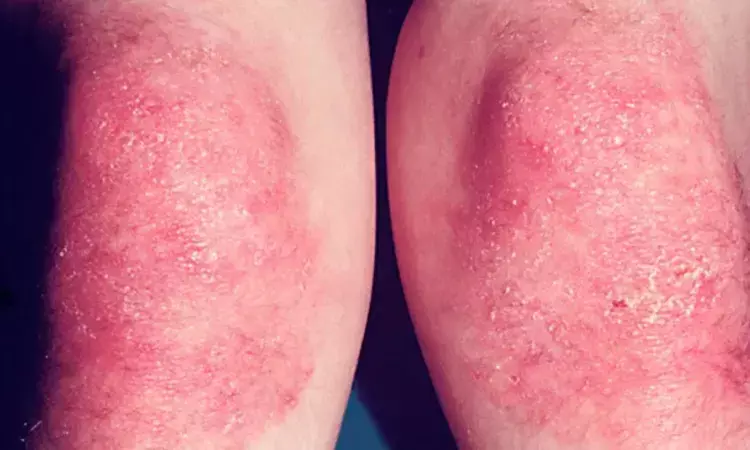- Home
- Medical news & Guidelines
- Anesthesiology
- Cardiology and CTVS
- Critical Care
- Dentistry
- Dermatology
- Diabetes and Endocrinology
- ENT
- Gastroenterology
- Medicine
- Nephrology
- Neurology
- Obstretics-Gynaecology
- Oncology
- Ophthalmology
- Orthopaedics
- Pediatrics-Neonatology
- Psychiatry
- Pulmonology
- Radiology
- Surgery
- Urology
- Laboratory Medicine
- Diet
- Nursing
- Paramedical
- Physiotherapy
- Health news
- Fact Check
- Bone Health Fact Check
- Brain Health Fact Check
- Cancer Related Fact Check
- Child Care Fact Check
- Dental and oral health fact check
- Diabetes and metabolic health fact check
- Diet and Nutrition Fact Check
- Eye and ENT Care Fact Check
- Fitness fact check
- Gut health fact check
- Heart health fact check
- Kidney health fact check
- Medical education fact check
- Men's health fact check
- Respiratory fact check
- Skin and hair care fact check
- Vaccine and Immunization fact check
- Women's health fact check
- AYUSH
- State News
- Andaman and Nicobar Islands
- Andhra Pradesh
- Arunachal Pradesh
- Assam
- Bihar
- Chandigarh
- Chattisgarh
- Dadra and Nagar Haveli
- Daman and Diu
- Delhi
- Goa
- Gujarat
- Haryana
- Himachal Pradesh
- Jammu & Kashmir
- Jharkhand
- Karnataka
- Kerala
- Ladakh
- Lakshadweep
- Madhya Pradesh
- Maharashtra
- Manipur
- Meghalaya
- Mizoram
- Nagaland
- Odisha
- Puducherry
- Punjab
- Rajasthan
- Sikkim
- Tamil Nadu
- Telangana
- Tripura
- Uttar Pradesh
- Uttrakhand
- West Bengal
- Medical Education
- Industry
Mycophenolate mofetil and methotrexate efficacy in dermatomyositis-BJD study

Mycophenolate mofetil and methotrexate efficacy in dermatomyositis- BJD study
Dermatomyositis is a rare connective tissue disease characterized by cutaneous involvement with muscle weakness and systemic symptoms. It is considered to be a paraneoplastic syndrome in older age group. Treatment of dermatomyositis (DM) is primarily targeted to control the myositis and cutaneous symptoms and signs.
The treatment typically follows a stepwise sequence starting with systemic corticosteroids along with immunosuppressants like methotrexate (MTX) or mycophenolate mofetil (MMF) after inadequate antimalarial response. However, data are scarce regarding the effectiveness of MTX and MMF in DM. Recently a study evaluating efficacy of mycophenolate mofetil and methotrexate in DM was published in the British Journal of Dermatology.
A cohort of 24 patients with skin predominant DM were identified from a prospective database at the University of Pennsylvania Perelman School of Medicine. Patients included in the cohort took MTX or MMF and had at least two study visits within a retrospective observation period
from October 2008 to February 2021. The Cutaneous Dermatomyositis Disease Area and Severity Index (CDASI), a validated disease scoring tool, was used to assess severity and outcomes. Patients with mild disease activity, defined as a CDASI activity (CDASI-A) score < 14 (maximum subscore of 100), were excluded as were any patients on medications used to treat DM other than MTX or MMF, with the exception of chronic antimalarials or topical medications.
For both MMF (n = 13) and MTX (n = 11), there was no baseline difference in CDASI-A scores at treatment initiation. There was no significant difference in the degree of improvement on either medication, with a mean difference in daily CDASI-A change between MTX and MMF of -0.0028 ± 0.0024 (P = 0.24) using a mixed linear effects model. For MTX, the median percentage change in CDASI-A between the first and last study visit was -74%. For MMF, the median percentage change was -76%.
A decrease of 40% or greater in the CDASI-A score has previously been associated with a meaningful change in quality of life. When 'responders' were defined as having a ≥ 40% improvement in their CDASI-A score between the first and second observations, 27% of the patients taking MTX were responders while 54% of patients taking MMF were responders.
The range of time varied between the first and second visits, with 50% of patients having a second study visit within 150 days. By last follow-up, 55% of patients taking MTX were considered responders and 77% of patients taking MMF met the criteria to be considered responders. For the patients treated with MTX, the median follow-up for the second visit was 178 days and for the last visit was 776 days. For those treated with MMF, the median follow-up was similar – 147 days for the second visit and 787 days for the last visit. Six patients who received MMF had previously been treated with MTX and one patient who received MTX had previously been treated with MMF.
In conclusion there was no significant difference between the efficacy of MTX and MMF in DM. The study suggests that responders continue to improve over time while most non- responders show little improvement at first follow-up during the observation period. Thus both MMF or MTX may be added to treatment plans for patients with DM who have not responded to antimalarials.
Source- Grinnell, M., Keyes, E., Diaz, D., Vazquez, T., Feng, R. and Werth, V.P. (2022), Mycophenolate mofetil and methotrexate efficacy in dermatomyositis. Br J Dermatol, 187: 437-438. https://doi.org/10.1111/bjd.21235
MBBS
Dr Manoj Kumar Nayak has completed his M.B.B.S. from the prestigious institute Bangalore medical college and research institute, Bengaluru. He completed his M.D. Dermatology from AIIMS Rishikesh. He is actively involved in the field of dermatology with special interests in vitiligo, immunobullous disorders, psoriasis and procedural dermatology. His continued interest in academics and recent developments serves as an inspiration to work with medical dialogues.He can be contacted at editorial@medicaldialogues.in.
Dr Kamal Kant Kohli-MBBS, DTCD- a chest specialist with more than 30 years of practice and a flair for writing clinical articles, Dr Kamal Kant Kohli joined Medical Dialogues as a Chief Editor of Medical News. Besides writing articles, as an editor, he proofreads and verifies all the medical content published on Medical Dialogues including those coming from journals, studies,medical conferences,guidelines etc. Email: drkohli@medicaldialogues.in. Contact no. 011-43720751


